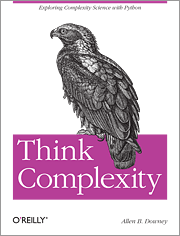 |
|
|
"Science is changing, but the curriculum hasn't caught up," says author Allen Downey. "Most students don't study complex systems in college, or even grad school. Learning about complexity science gives readers a different toolkit, a different approach to problems, and a different way of thinking."
Downey's new book, Think Complexity (O'Reilly Media, $29.99 USD) will help readers:
- Work with NumPy arrays and SciPy methods, basic signal processing and Fast Fourier Transform, and hash tables
- Study abstract models of complex physical systems, including power laws, fractals and pink noise, and Turing machines
- Get starter code and solutions to help you re-implement and extend original experiments in complexity
- Explore the philosophy of science, including the nature of scientific laws, theory choice, realism and instrumentalism, and other topics
- Examine case studies of complex systems submitted by students and readers
P.S. If you're a programmer, you have the skills to turn data into knowledge using the tools of probability and statistics. Downey's first book, Think Stats, shows you how to perform statistical analysis computationally, rather than mathematically, with programs written in Python.
About O’Reilly
O’Reilly Media spreads the knowledge of innovators through its books, online services, magazines, and conferences. Since 1978, O’Reilly Media has been a chronicler and catalyst of cutting-edge development, homing in on the technology trends that really matter and spurring their adoption by amplifying “faint signals” from the alpha geeks who are creating the future. An active participant in the technology community, the company has a long history of advocacy, meme-making, and evangelism.